Ever get stuck searching for the right word in a conversation or feel like your vocabulary could use a boost? You’re not alone. Whether you’re prepping for a test, learning a new language, or just want to sound more confident when you speak, the right vocabulary app can make a huge difference. The good news? There are tons of great apps out there that make learning new words feel less like homework and more like a game. Let’s dive into some of the best ones that are actually worth your time.
While we’re on the topic of apps that help you grow and learn, it’s not just about building vocabulary, it’s also about building better habits in other areas of life. Take ReciMe, for example. It’s our recipe and meal planning app that helps you keep all your favorite dishes in one place, build smart grocery lists, and plan your meals without the usual stress. Whether you’re trying to eat better, save time, or just stay a bit more organized in the kitchen, ReciMe is one of those tools that quietly makes a big difference in your day-to-day routine. Give it a try and see how much simpler cooking and meal prep can be.



1. WordUp
WordUp is an AI-powered vocabulary builder designed to make learning English not just effective, but actually enjoyable. Whether you’re brushing up on words for an upcoming exam or just want to speak with more confidence, this app adapts to your level and keeps things engaging with videos, quizzes, and games. Instead of dumping a massive list of random words on you, WordUp helps you focus on the most useful ones for your goals.
One of the coolest things about WordUp is the way it maps your vocabulary knowledge. It shows you what words you already know and where the gaps are. Then it guides you through filling in those gaps using spaced repetition, which basically means reviewing words just when you’re about to forget them. Plus, each word comes packed with movie clips, real-world examples, and even translations in over 30 languages to give more context and depth.
It’s not just for test-takers or non-native speakers either. Even if you’re fluent in English, WordUp can help sharpen your communication skills or expand your vocabulary in specific areas like business or travel. You can also use it as a dictionary with a serious upgrade – one that shows you how words work in real life instead of just listing definitions.
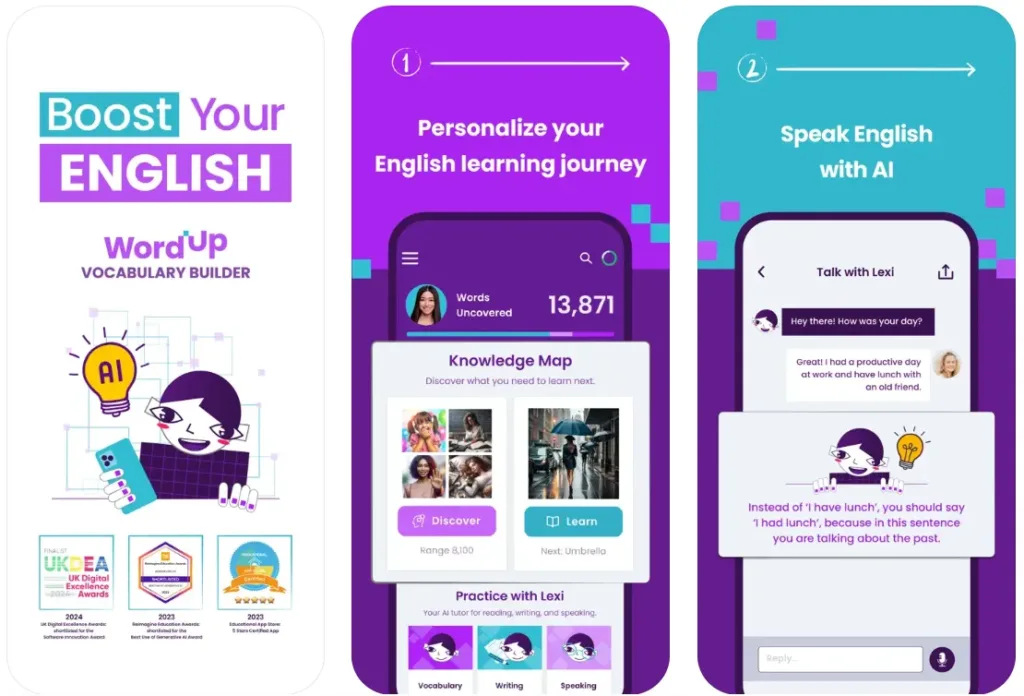
Key Points:
- Personalized learning using an AI-based knowledge map
- 25,000+ high-utility English words ranked by importance and usage
- Engaging examples from movies, quotes, and real-life situations
- Spaced repetition and games to help lock in new words
Why Choose This App:
- Great for learners at any level – from beginners to advanced
- Works well for both daily casual learning and structured exam prep
- Keeps you motivated with real-world context and fun challenges
Contact and Social Media Information:
- Website: www.wordupapp.co
- App Store: apps.apple.com/us/app/wordup-vocabulary-builder/id1365078730
- Google Play: play.google.com/store/apps/details?id=co.wordupapp.app
- E-mail: hello@wordupapp.co
- Facebook: www.facebook.com/TheWordUpApp
- Twitter: x.com/TheWordUpApp
- LinkedIn: www.linkedin.com/company/wordup-app
- Instagram: www.instagram.com/wordup.app
- Address: 6 Sutton Park Road, Sutton, London, UK, SM1 2GD
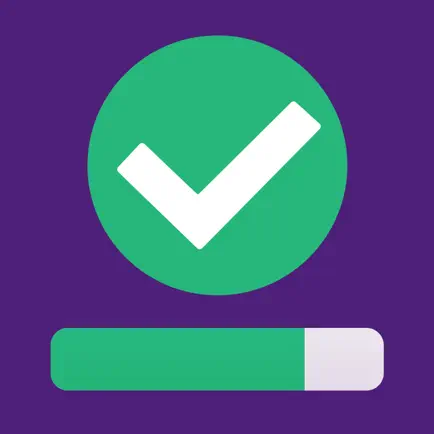
2. Magoosh Vocabulary Builder
Magoosh Vocabulary Builder is a straightforward but seriously useful app made for learners who want to boost their vocabulary skills, especially for standardized tests like the GRE, SAT, and TOEFL. It’s built around the idea of turning vocab practice into a game you actually want to play. With over 1,200 hand-picked words, this app helps you grow your word bank in a structured, level-based format that gets more challenging as you go.
The app was designed by expert tutors, including Chris Lele, who’s been helping students prep for the GRE for over a decade. Every word in the app comes with a definition, pronunciation, and example sentence. You start with easier words and work your way up to advanced ones, unlocking new sets as you master each level. Words you struggle with come back again and again, thanks to spaced repetition, so you don’t forget them.
What makes Magoosh’s app stand out is how focused and no-frills it is. It doesn’t overwhelm you with unnecessary features. Instead, it gives you exactly what you need to learn vocabulary efficiently – whether you’re prepping for a big exam or just want to sound sharper in conversations. And it’s totally free, with progress saved across devices when you sign in.
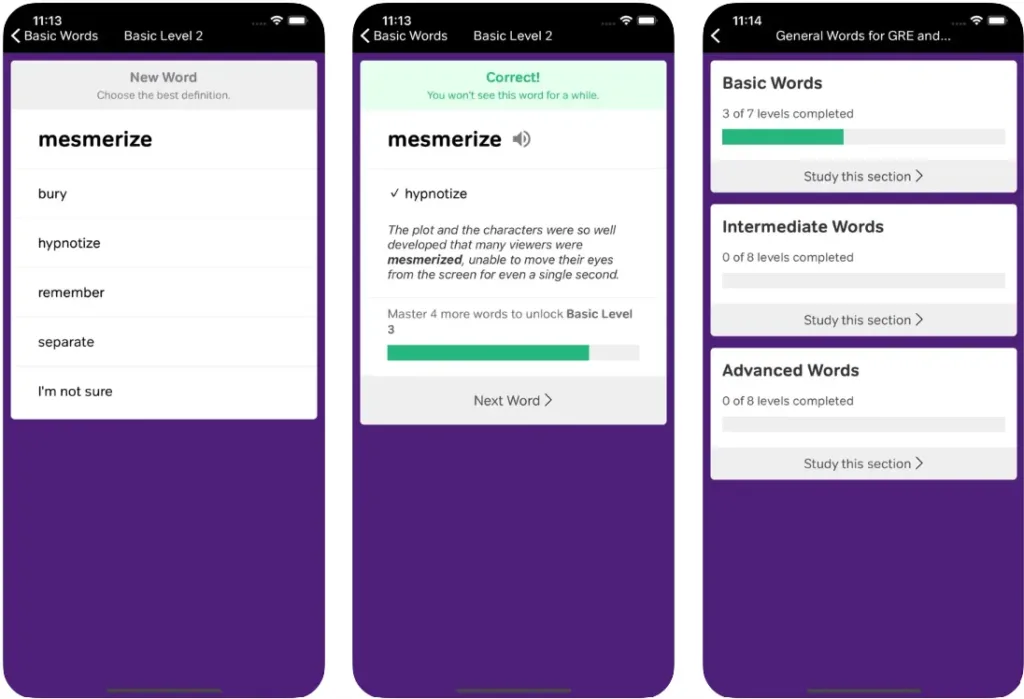
Key Points:
- Covers 1,200 essential GRE, SAT, and TOEFL vocabulary words
- Created by expert tutors with years of test-prep experience
- Built-in spaced repetition to help retain what you learn
- Includes pronunciation, definitions, and example sentences for every word
Why Choose This App:
- Perfect for students preparing for exams like the GRE or SAT
- Easy to use with a fun, level-up structure that keeps you going
- Great for quick daily practice sessions on the go
Contact and Social Media Information:
- Website: magoosh.com
- App Store: apps.apple.com/us/app/vocabulary-builder-by-magoosh/id890252250
- Google Play: play.google.com/store/apps/details?id=com.magoosh.gre.quiz.vocabulary
- E-mail: help@magoosh.com
- Facebook: www.facebook.com/magoosh
- Twitter: x.com/magoosh
- LinkedIn: www.linkedin.com/company/magoosh
- Instagram: www.instagram.com/magooshtestprep
- Address: 548 Market St PMB 44023, San Francisco, CA 94104
- Phone: 1-510-617-5733

3. Vocabulary.com
Vocabulary.com takes a unique and surprisingly fun approach to building your word skills. It blends a personalized learning system with an interactive game that makes improving your vocabulary feel less like studying and more like a challenge. Whether you’re prepping for the SAT or just want to stop Googling word meanings every five minutes, this app can help.
At its core, Vocabulary.com is driven by smart technology. It uses algorithms that figure out what words you know, what you don’t, and how well you’re doing as you progress. You can pick from thousands of ready-made word lists or build your own. And if you’re not sure where to start, the app will do the work for you by picking words that match your skill level. You also earn points, unlock badges, and see how you stack up against others.
One of the standout features is the dictionary. Unlike most dictionary apps, this one explains words like a real person would – clearly and with humor. You’ll see how the word is used in the real world, often with social or historical context and helpful examples. It’s not just about memorizing definitions – it’s about truly understanding how to use the words in your everyday life.
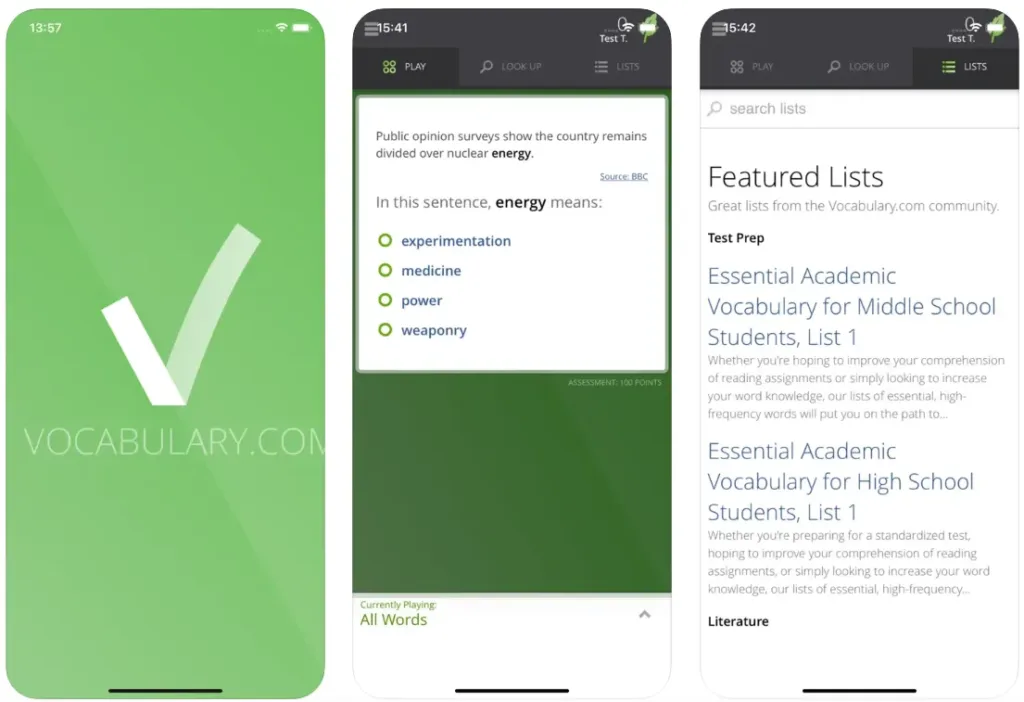
Key Points:
- Powered by a smart, adaptive learning system with 15,000+ words
- Turns vocabulary learning into a fun game with points and achievements
- Massive library of 50,000+ word lists for school, exams, or general use
- Human-written definitions and examples that actually make sense
Why Choose This App:
- Great if you want a more flexible, personalized way to learn words
- Ideal for students, professionals, or anyone aiming to level up their language
- Combines a powerful dictionary with addictive learning tools
Contact and Social Media Information:
- Website: www.vocabulary.com
- App Store: apps.apple.com/us/app/vocabulary-com/id815218412
- Google Play: play.google.com/store/apps/details?id=com.vocab.app
- Facebook: www.facebook.com/vocabularycom
- Twitter: x.com/VocabularyCom
- LinkedIn: www.linkedin.com/company/vocabulary-com
- Instagram: www.instagram.com/vocabcom
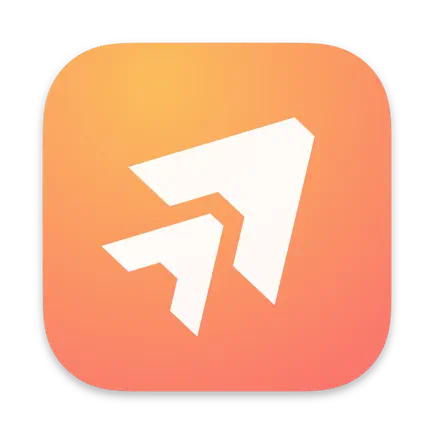
4. AnkiApp
AnkiApp is a flexible and powerful flashcard app that helps you learn just about anything – from vocabulary and languages to medical terms and test prep content. It’s built around the concept of spaced repetition, using AI to figure out which flashcards you need to see and when. That way, you’re not wasting time reviewing stuff you already know. Instead, it focuses on what actually needs reinforcing.
One of the biggest strengths of AnkiApp is how customizable it is. You can create your own flashcards, use colors and formatting, and even add pictures or audio. If that sounds like too much work, no problem – there are millions of pre-made flashcard decks you can download instantly. The app works smoothly across devices, so everything you do syncs whether you’re studying on your phone, tablet, or laptop.
Even though it’s packed with features, AnkiApp keeps things clean and simple. It doesn’t force a strict schedule, so you can study whenever it works for you. The dashboard shows your progress at a glance, and little touches like night mode and voice-read flashcards make it more comfortable and accessible. It’s not the official Anki, but it offers a polished, standalone experience with plenty of tools to support deep learning.
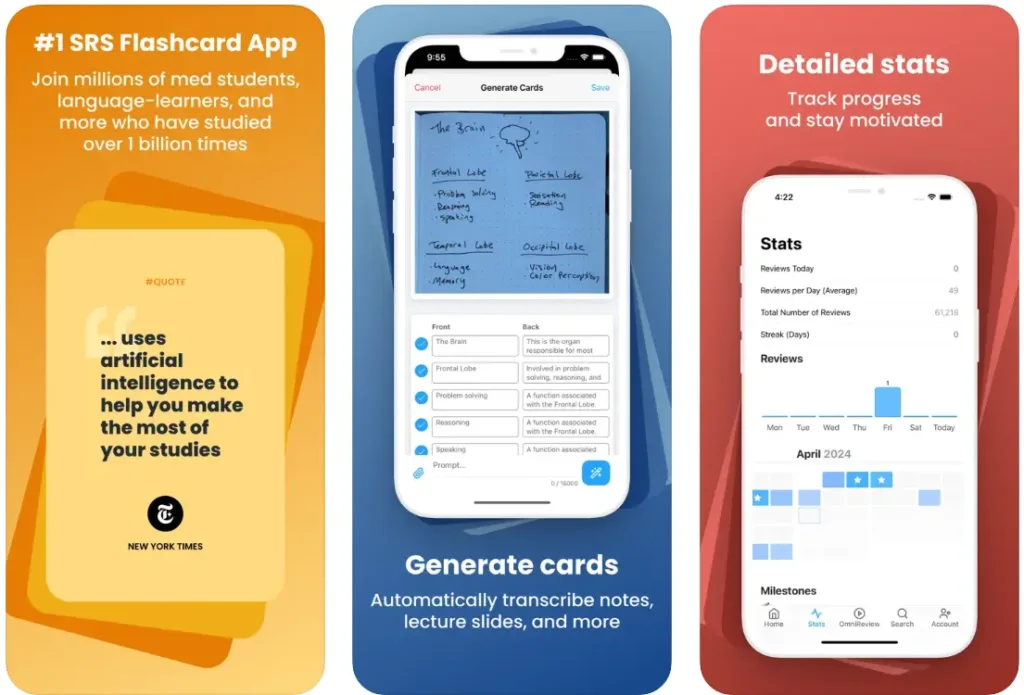
Key Points:
- Uses AI-powered spaced repetition to optimize your study sessions
- Create custom decks or download from a huge library of pre-made flashcards
- Supports text, images, and audio with powerful formatting options
- Works offline and syncs across all your devices automatically
Why Choose This App:
- Ideal if you want total control over what and how you study
- Great for learning vocabulary in different languages or subjects
- Simple interface but powerful under the hood with flexible tools
Contact and Social Media Information:
- Website: www.ankiapp.com
- App Store: apps.apple.com/us/app/ankiapp-flashcards/id689185915
- Google Play: play.google.com/store/apps/details?id=com.ankiapp.client
- E-mail: support@ankiapp.com
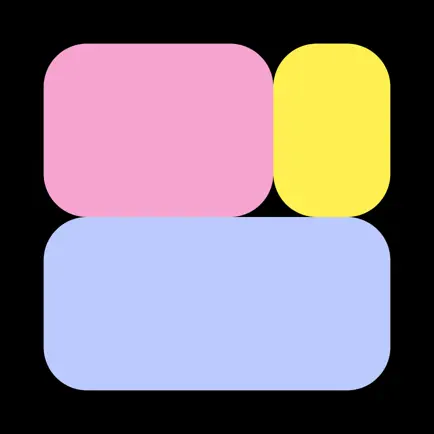
5. Promova
Promova is a modern language learning app that brings together vocabulary practice, conversation tools, and immersive content into one flexible platform. Whether you’re just starting out or trying to polish your skills, it’s built to adapt to how you learn best. You can go at your own pace with bite-sized lessons or try live classes and chats with tutors or fellow learners around the world.
One thing that sets Promova apart is its wide range of tools. You’re not limited to flashcards or basic quizzes. There’s AI-powered conversation practice, themed vocabulary modules, interactive books with word explanations, and even personalized learning plans. The AI chat lets you role-play real-life situations like job interviews or restaurant visits, while giving instant feedback on your pronunciation and grammar.
Promova supports 12 different languages, including English, French, Spanish, German, and even American Sign Language. It also offers a unique English-to-English course that helps you improve your vocabulary and comprehension without relying on translations. Whether you’re using it casually on your phone or diving into a full study session on your computer, Promova makes it easy to keep learning wherever you are.
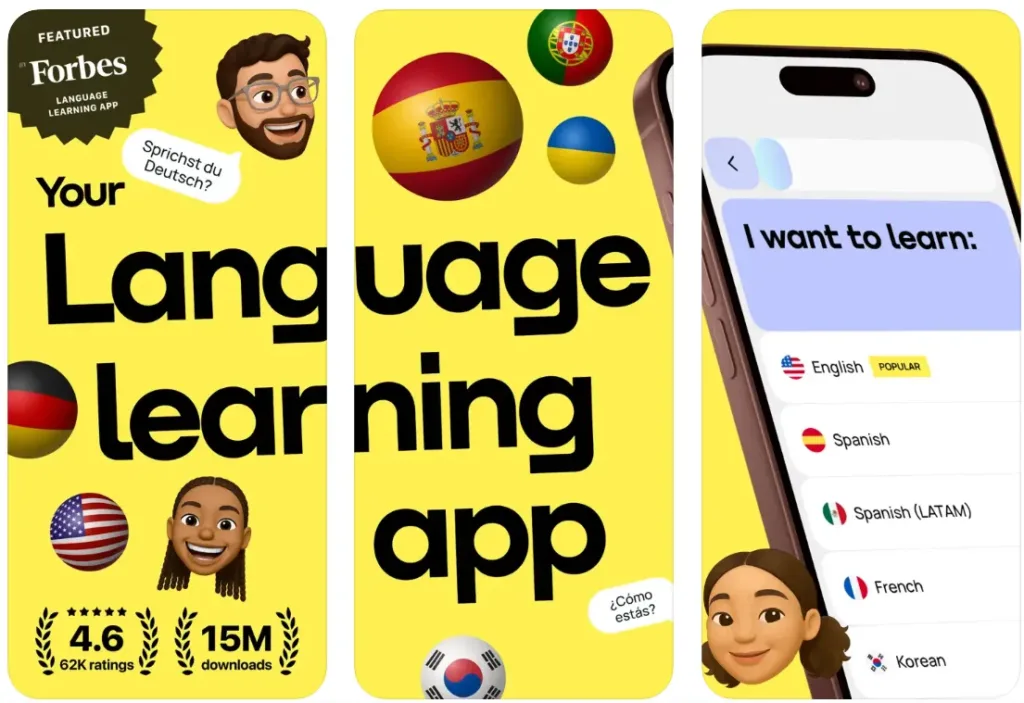
Key Points:
- Covers 12 languages, including English, Spanish, French, Arabic, and more
- Offers a mix of learning tools: flashcards, AI chat, books, and lessons
- Personalized plans with progress tracking and flexible goals
- Interactive books and illustrated lessons for deeper understanding
Why Choose This App:
- Great for people who want more than just memorizing words
- Perfect if you’re looking to improve speaking, not just reading
- Supports all learning styles with self-study, tutor sessions, and community chats
Contact and Social Media Information:
- Website: promova.com
- App Store: apps.apple.com/us/app/promova-language-learning/id1460782849
- Google Play: play.google.com/store/apps/details?id=com.appsci.tenwords
- E-mail: support@promova.com
- Facebook: www.facebook.com/promova
- Instagram: www.instagram.com/promova
- Address: Unlimited Promova Limited, 15 Nafpliou Str., 3025, Limassol, Cyprus
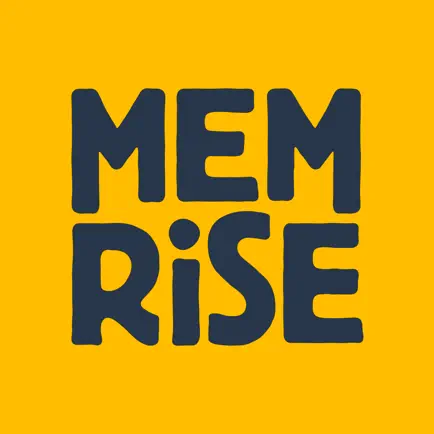
6. Memrise
Memrise is a language learning app built around real-life communication. It’s not just about memorizing words or getting through grammar drills. Instead, it focuses on helping you understand how people actually speak in day-to-day situations. You get to learn useful phrases, see how native speakers use them, and then try them out yourself in conversations.
The app covers over 30 languages, from Spanish and Japanese to Turkish, Yoruba, and more. What makes it stand out is the mix of short, focused lessons with tons of real-world examples. You’ll watch native speaker videos, learn the words and phrases they use, and then practice with AI tools that guide you through speaking and building sentences. It’s designed to feel more like preparing for a real conversation than studying from a textbook.
Everything in Memrise is pretty straightforward. You choose your language, pick a topic that interests you, and start learning through practical examples. You can set your own pace, go back and review anything you missed, and track your progress over time. Whether you’re learning for travel, work, or just for fun, Memrise is built to help you speak more naturally and confidently.
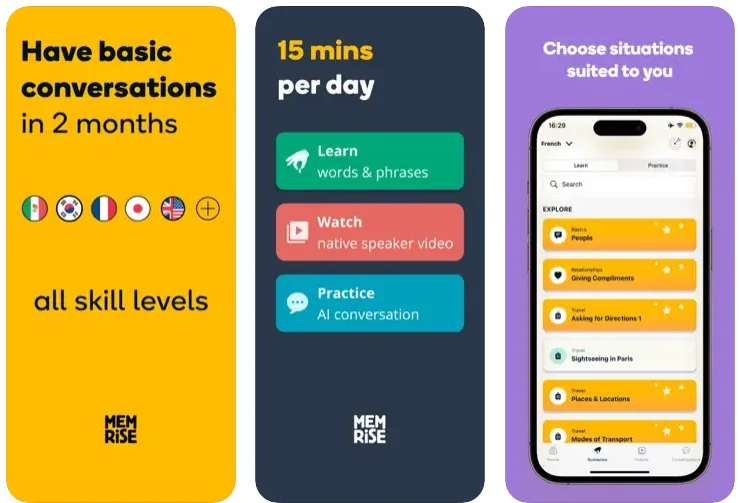
Key Points:
- Offers lessons in 30+ languages with practical, everyday vocabulary
- Native speaker videos show how words are used in real conversations
- AI-powered speaking practice helps improve fluency and confidence
- Focuses on natural communication instead of memorizing random words
Why Choose This App:
- Good mix of structure and flexibility, depending on how you like to learn
- Teaches words and phrases that are actually used in real life
- Simple, intuitive design that doesn’t get in your way
Contact and Social Media Information:
- Website: www.memrise.com
- App Store: apps.apple.com/us/app/memrise-easy-language-learning/id635966718
- Google Play: play.google.com/store/apps/details?id=com.memrise.android.memrisecompanion
- Facebook: www.facebook.com/memrise
- Twitter: x.com/memrise
- Instagram: www.instagram.com/memrise
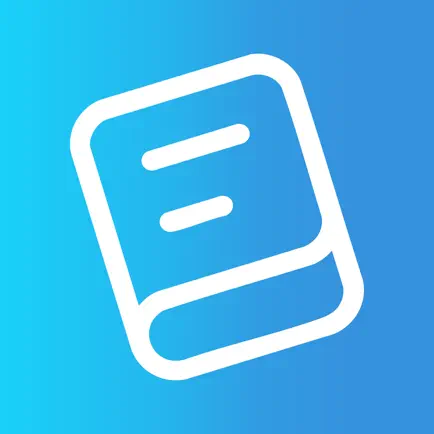
7. Wordela
Wordela is all about helping you build a stronger vocabulary without making it feel like a chore. Whether you’re brushing up your language skills for school, work, or just for fun, this app gives you the tools to expand your word knowledge in a way that’s simple, clear, and pretty satisfying. It blends word definitions, examples, and challenges into a clean, easy-to-use format that makes it easy to stay consistent.
The app gives you a fresh set of word challenges every day. These aren’t just random vocabulary drills, they’re well put together with a mix of definitions, synonyms, and example sentences that show how the words are actually used. You can also track your progress over time and set personal goals, which adds a nice sense of direction as you go. It’s helpful whether you’re aiming for general vocabulary improvement or prepping for something more specific like a test.
One of the nice touches is that it syncs across your devices, so you can start on your phone in the morning and pick up later on your tablet without losing your place. It’s not overloaded with distractions or fluff either, just a focused, no-nonsense approach to growing your vocabulary.
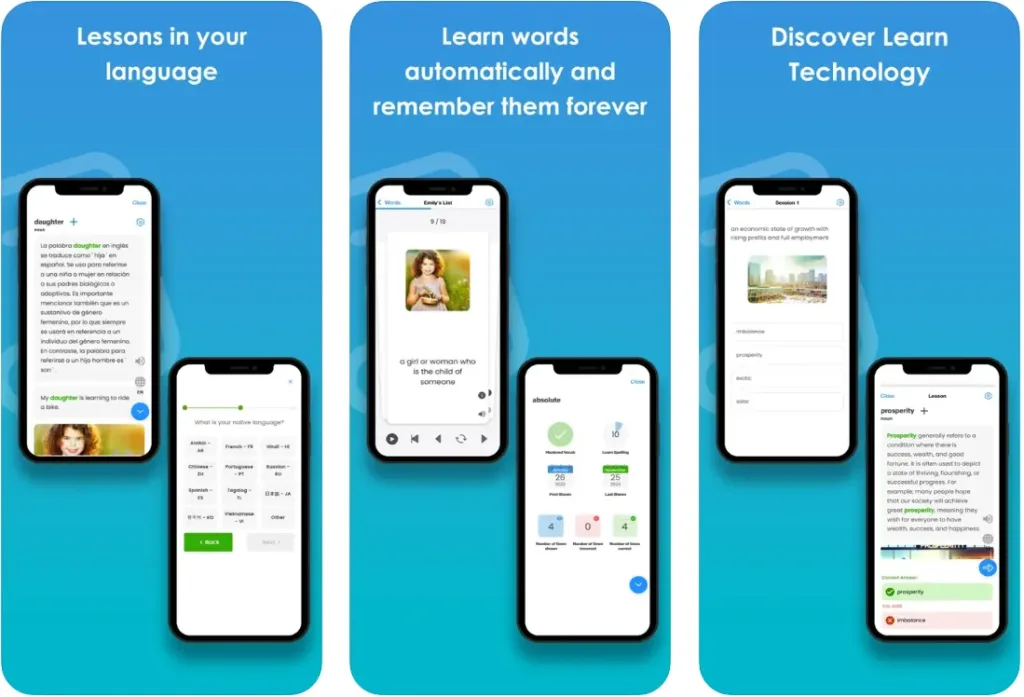
Key Points:
- Helps you learn words with definitions, synonyms, and examples
- Includes daily challenges that build up gradually in difficulty
- Tracks your progress and lets you set custom goals
- Works across devices with synced achievements and lessons
Why Choose This App:
- Great if you want to learn new words at your own pace without pressure
- Simple layout and features that make it easy to stay on track
- Ideal for students, professionals, and anyone who enjoys a good word challenge
Contact and Social Media Information:
- Website: www.wordela.com
- App Store: apps.apple.com/us/app/wordela-vocabulary-builder/id1636414835
- Google Play: play.google.com/store/apps/details?id=com.ereflect.wordela
- Address: 3651 Lindell Rd. Suite D1104, Las Vegas, NV 89103
- Phone: 1-800-706-5904
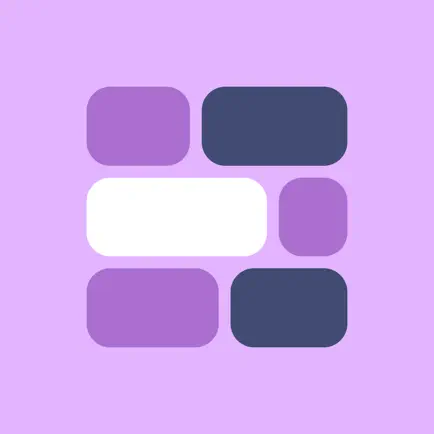
8. Lingvist
Lingvist is a smart, no-nonsense language learning app built to help you learn vocabulary fast and effectively. It uses AI and spaced repetition to figure out where you’re at and what words you’re ready to learn next. So instead of cycling through stuff you already know, it keeps your focus on the words you’re just about to forget – helping them really stick long-term.
You can pick from 15+ languages, including Spanish, French, German, Korean, Japanese, and even Estonian. There are also options to learn English for speakers of several other languages. The app is built around full-sentence learning, so you’re not just memorizing translations – you’re learning how the words actually work in real life. Plus, it sprinkles in grammar tips naturally as you go, which helps everything click.
A cool feature is the ability to create custom word decks from content like articles or textbooks. You can drop in a topic you’re interested in, and Lingvist builds a set of vocab that fits. It’s great if you’re prepping for a trip, working on a specific subject, or just want to make your learning feel more personal. Everything is clean, simple, and focused – no ads, no fluff, just solid tools to help you build real language skills.
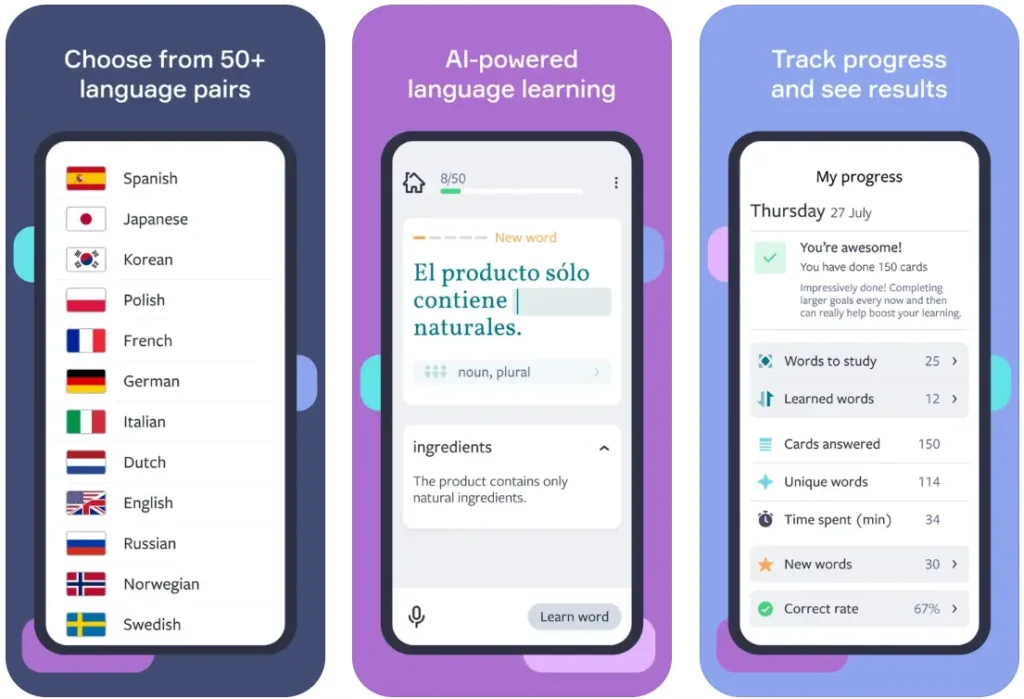
Key Points:
- Uses AI and spaced repetition to teach the most useful words
- Learn full sentences with grammar tips built in
- Supports over 15 languages, including regional options
- Allows custom deck creation based on your interests or content
Why Choose This App:
- Perfect if you want an efficient, focused approach to vocabulary
- Helps you learn words in context, not just by memorization
- Good for both beginners and advanced learners who want to deepen their skills
Contact and Social Media Information:
- Website: lingvist.com
- App Store: apps.apple.com/us/app/lingvist-learn-languages-fast/id969093402
- Google Play: play.google.com/store/apps/details?id=io.lingvist.android
- E-mail: hello@lingvist.io
- Facebook: www.facebook.com/TheLingvist
- Twitter: x.com/lingvist
- LinkedIn: www.linkedin.com/company/lingvist
- Instagram: www.instagram.com/thelingvist
- Address: Veerenni 40a, Tallinn, 10138 Estonia
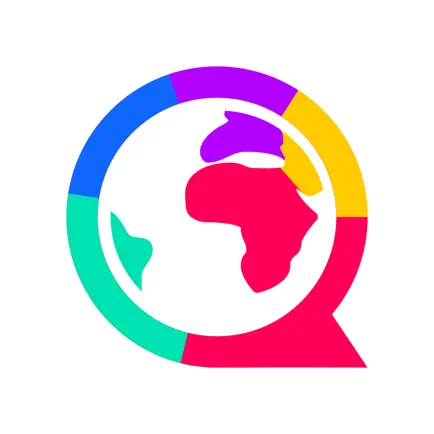
9. FluentU
If you’re tired of memorizing word lists or going through the same flashcards over and over, FluentU might be more your style. It teaches vocabulary through videos, stuff like music, movie trailers, news clips, and even little talks. You watch the video with subtitles, and whenever a word pops up that you don’t know, you can just tap it. Boom, you get the meaning, how it’s used, how it’s pronounced, and you can save it to your list to go over later.
What makes it different is that you’re learning new words by actually hearing them in real conversations. It doesn’t throw isolated vocab at you, it shows you how the words fit into natural speech. You’re more likely to remember them this way because they stick in your head as part of a scene or sentence, not just a definition.
The app covers languages like Spanish, French, Korean, Japanese, Chinese, and a few more. It’s not trying to be a full-on grammar course, and honestly, that’s fine. It focuses on building vocabulary through context, which is great if you already know the basics and want to level up the words you actually use and understand.
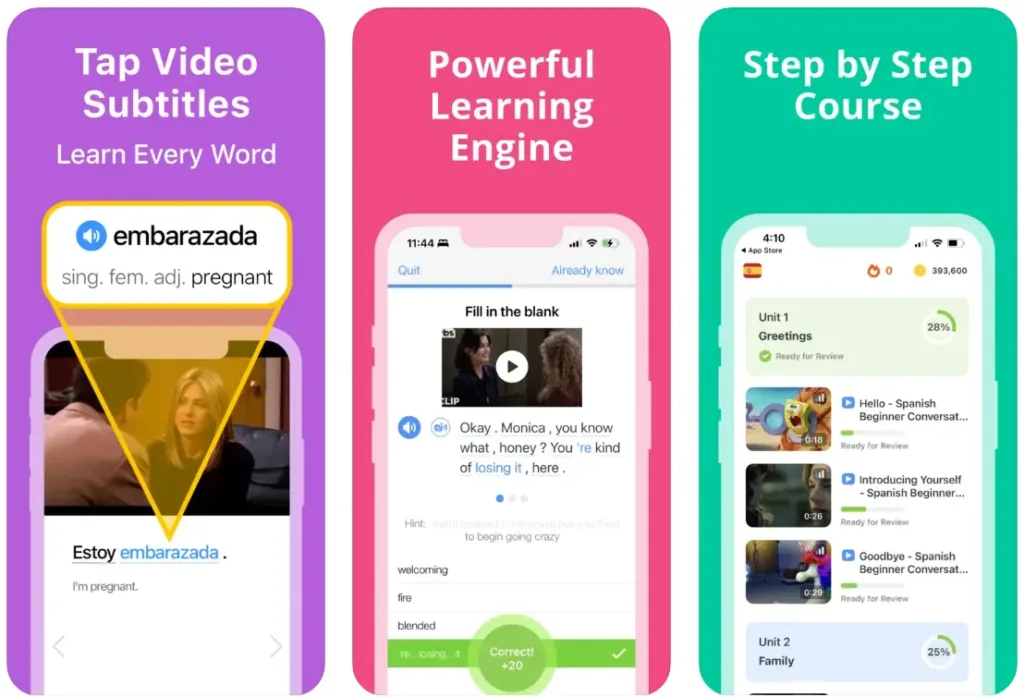
Key Points:
- Teaches vocabulary using real-life videos like songs and news clips
- Tap any word to get its meaning, pronunciation, and examples
- Builds personalized word lists from what you’re watching
- Helps you hear how words are used naturally, not just what they mean
Why Choose This App:
- You learn words by seeing and hearing them in real context
- It’s more fun than traditional vocab drills or flashcards
- Perfect if you want to expand your vocabulary past the basics
Contact and Social Media Information:
- Website: ww.fluentu.com
- App Store: apps.apple.com/us/app/fluentu-learn-language-videos/id917892175
- Google Play: play.google.com/store/apps/details?id=com.fluentflix.fluentu
- E-mail: support@fluentu.com
- Facebook: www.facebook.com/FluentU
- Twitter: x.com/FluentU
- Address: 21st Floor, Yat Chau Building, 262 Des Voeux Road Central, Sheung Wan, Hong Kong
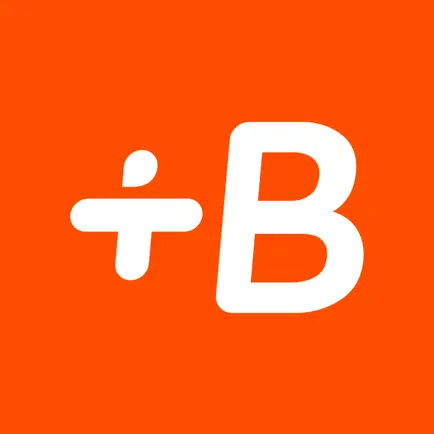
10. Babbel
Babbel is a well-known language learning app built by actual language experts, not just tech developers, and it shows in how it teaches vocabulary. Instead of flooding you with random words, Babbel introduces vocabulary that’s tied to real-life situations, like ordering food, meeting new people, or getting around a city. The lessons are short, so they’re easy to squeeze into your day without it feeling like a huge task.
When it comes to vocabulary, Babbel helps you learn new words through writing, speaking, listening, and reading. You don’t just see a word once and hope it sticks. The app keeps reviewing it in different formats, which helps you actually remember and use it. Plus, it includes pronunciation tips and speech recognition, so you’re not just learning how a word looks, you’re learning how to say it and understand it in conversation.
One thing Babbel does really well is putting vocabulary in context. Instead of just giving you a list to memorize, it walks you through short conversations and examples so you can see how the words work in everyday language. If you’re looking to build a useful, practical vocabulary you’ll actually use, Babbel makes that process feel smooth and doable.
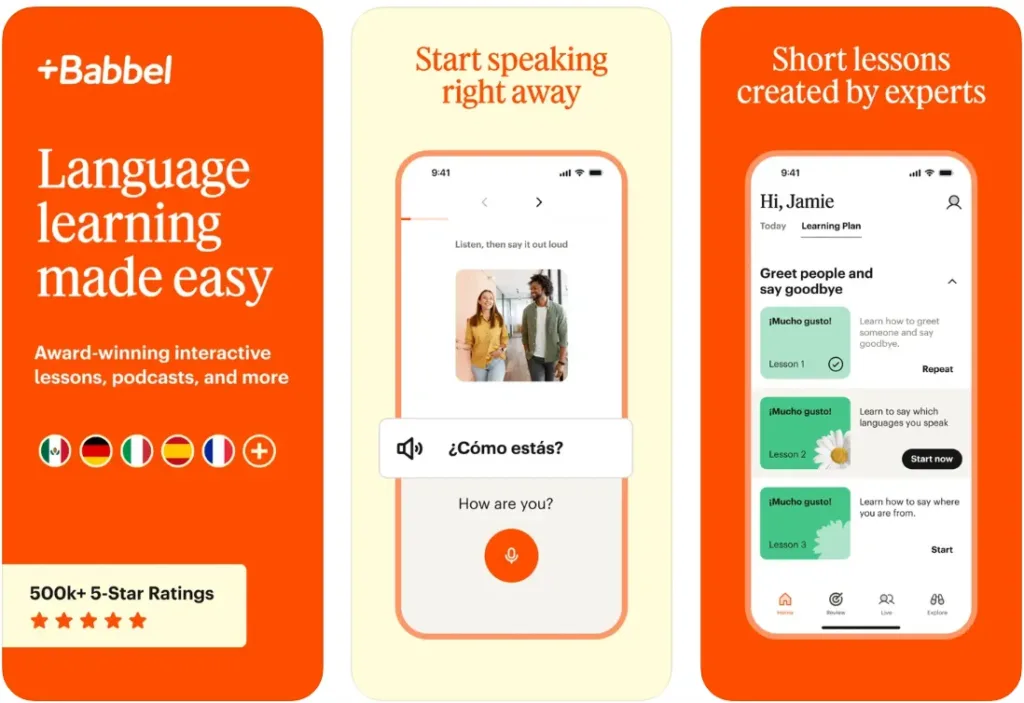
Key Points:
- Teaches vocabulary in real-world scenarios like travel and daily life
- Uses all four skills (reading, writing, listening, speaking) to reinforce new words
- Includes review tools so you don’t forget what you’ve learned
- Offers over 60,000 short lessons across 14 languages
Why Choose This App:
- Great for building a practical vocabulary you’ll use in real conversations
- Lessons are short and easy to fit into any schedule
- Designed by real language experts, not just software engineers
Contact and Social Media Information:
- Website: www.babbel.com
- App Store: apps.apple.com/us/app/babbel-language-learning/id829587759
- Google Play: play.google.com/store/apps/details?id=com.babbel.mobile.android.en
- Facebook: www.facebook.com/babbel.languages
- LinkedIn: www.linkedin.com/company/babbel-com
- Instagram: www.instagram.com/babbel
- Address: 285 Madison Ave, New York, NY 10017, United States
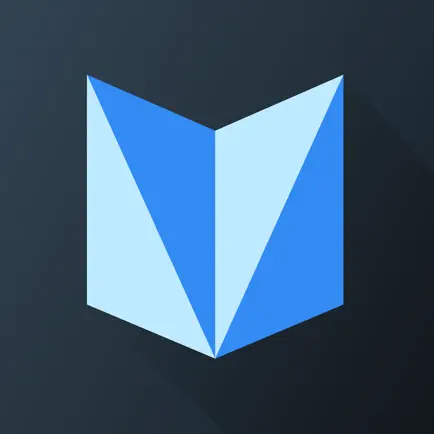
11. Improve English by Knudge
Knudge (also called Knudge.me) is all about helping you build your vocabulary in a fun, stress-free way. It breaks things down into short, bite-sized lessons and flashcards that are easy to fit into your day. Whether you’re just starting out or want to brush up on advanced vocabulary, Knudge has wordlists and mini-courses designed to fit your level. Everything is designed to feel approachable, not overwhelming.
There are different vocabulary builder courses for beginners, intermediate learners, and advanced users. Each one gives you clear definitions, example sentences, and visual aids to make the meaning stick. They even include synonyms and antonyms, so you’re not just learning what a word means, you’re getting a deeper sense of how to use it and when. For anyone prepping for competitive exams like GRE, IELTS, or TOEFL, this is especially useful.
But what really sets Knudge apart is how much it leans into game-based learning. You’re not just memorizing words, you’re playing games that reinforce spelling, meaning, usage, and pronunciation. From word mazes to dictation games, there’s always something new to try. It’s a smart way to learn that doesn’t feel like studying.
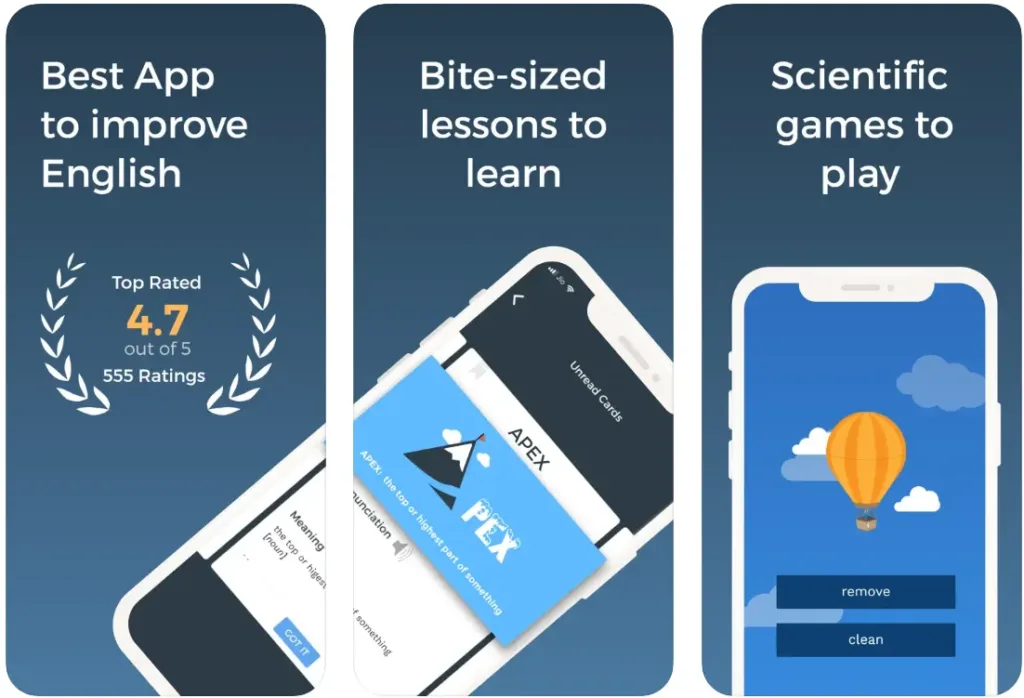
Key Points:
- Vocabulary builder courses for all levels, from beginner to advanced
- Flashcards with definitions, synonyms, and example sentences
- Specialized lists for competitive exams like GRE, GMAT, and IELTS
- Word games make learning vocabulary fun and interactive
Why Choose This App:
- Great for structured vocabulary growth with visual and interactive tools
- Perfect mix of study and play with games that keep you engaged
- Ideal for exam prep or anyone looking to seriously upgrade their word knowledge
Contact and Social Media Information:
- Website: knudge.me
- App Store: apps.apple.com/in/app/improve-english-by-knudge/id1358258808
- Google Play: play.google.com/store/apps/details?id=com.knudge.me
- E-mail: contact@knudge.me
- Facebook: www.facebook.com/knudge.me
- Twitter: x.com/knudge_me
- LinkedIn: www.linkedin.com/company/knudge.me
- Instagram: www.instagram.com/knudge.me
- Address: No 154, Workshaala Spaces, 2nd floor Sector 5- HSR layout, Next to Devi Eye Hospital, Bengaluru, Karnataka 560102
- Phone: +91-8527239621
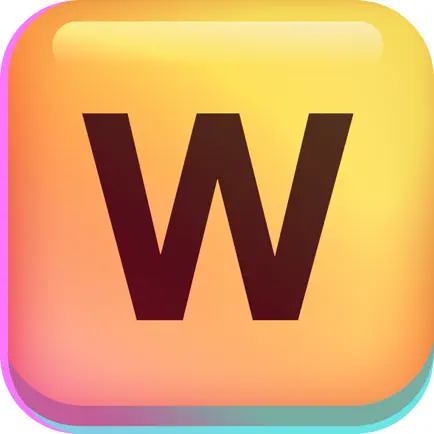
12. Words With Friends
Words With Friends is a classic multiplayer word game that puts your vocabulary to the test while keeping things social and fun. You play on a Scrabble-style board, trying to build the highest scoring words from your set of letter tiles. You can challenge friends or get matched with a random opponent, and then it’s game on. It’s part puzzle, part strategy, and all about the words you know (and the ones you figure out along the way).
Even though it’s a game first, it’s actually a great way to grow your vocabulary without even realizing it. Every turn gives you a chance to think through word choices, try out new combos, and spot uncommon or higher-scoring words. Plus, the app often features themed WordMasters, daily word challenges, and mini-games like Word Wheel to keep your brain working in different ways.
If you’re into games but still want something that sharpens your language skills, this one strikes a solid balance. You’re having fun, but you’re also getting better at recognizing patterns, spelling tricky words, and pushing beyond the usual vocabulary you might use in everyday conversations.
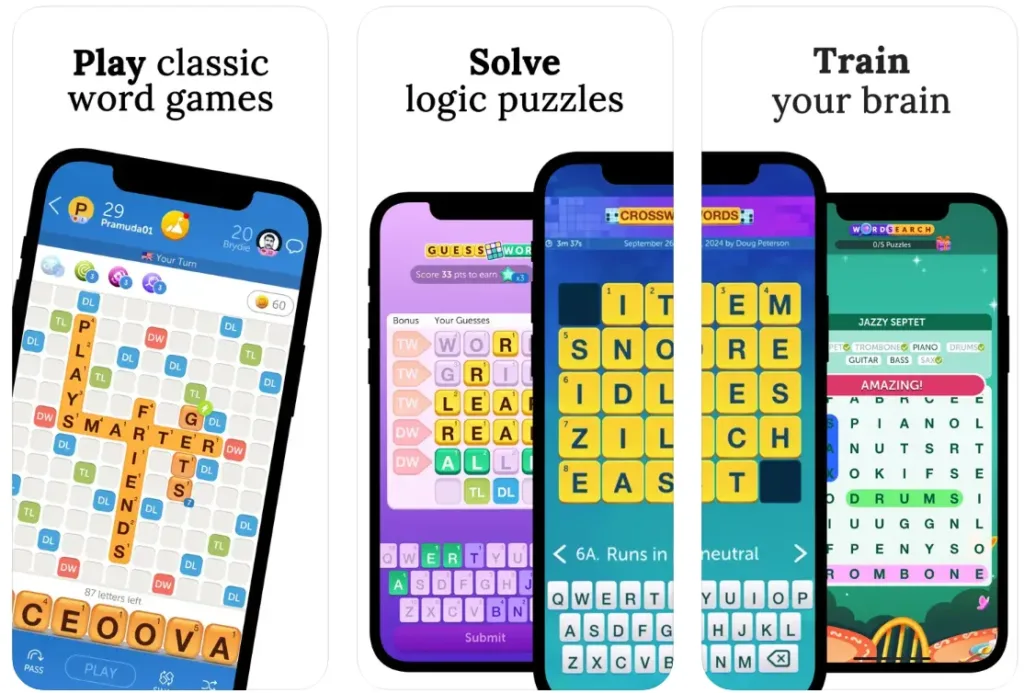
Key Points:
- Classic word-building game with a multiplayer twist
- Encourages creative thinking and deeper vocabulary use
- Daily and weekly challenges keep things fresh
- Includes solo mode, anagram puzzles, and fun word-based goals
Why Choose This App:
- You can expand your vocabulary while playing with friends
- Game elements make learning feel casual and low-pressure
- Great way to improve word recall and spelling through play
Contact and Social Media Information:
- Website: wordswithfriends.com
- App Store: apps.apple.com/us/app/words-with-friends-word-game/id1196764367
- Google Play: play.google.com/store/apps/details?id=com.zynga.words3
- Facebook: www.facebook.com/WordsWithFriends
- Twitter: x.com/WordsWFriends
- LinkedIn: www.linkedin.com/company/zynga
- Instagram: www.instagram.com/wordswithfriends
- Address: Zynga Inc., 1200 Park Place, San Mateo, California 94403
Final Thoughts
Building a stronger vocabulary doesn’t have to feel like homework. With so many great apps out there, you can learn new words, practice tricky ones, and even have fun while doing it. Whether you’re preparing for an exam, trying to sound more polished in conversations, or just love learning languages, there’s an app that fits your style and pace.
The key is to find the one that keeps you coming back, maybe it’s the games, the flashcards, the daily challenges, or just the satisfaction of leveling up your skills. Whatever it is, stick with it. A better vocabulary can open up new ways to express yourself, boost your confidence, and help you connect with people more clearly. So pick one, start small, and let your word power grow.
